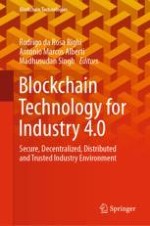This book explores recent advances in blockchain technology and its impact on Industry 4.0 via advanced technologies. It provides an in-depth analysis of the step by step evolution of Industry 4.0 and blockchain technologies for creating the next-generation, secure, decentralized, distributed and trusted industry environment and enhancing the productivity of industries. The book describes how blockchain technology makes the industrial internet (Industry 4.0) a transparent, reliable and secure environment for people, processes, systems, and services, presenting a strong, technological and conceptual framework and roadmap for decision-makers involved in the transformation of any area of industry.
